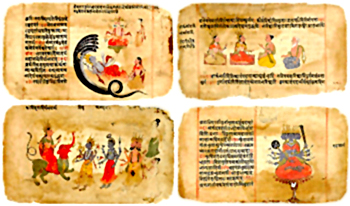 Non-religious poems in Rig Veda also find significant mention in this ancient literary text. Though the Rig Veda contains a number of mantras and verses which are religious in nature, it is quite a significant fact that some apparently quite secular poems have got mixed amongst the sacred songs and sacrificial chants of the Rig Veda. A number of such non-religious poems are to be found in the Rig Vedic text. Thus, we find, for example, in the midst of the Soma songs a satirical poem, which derides the manifold desires of mankind. It is probably an old popular song of the "labour song" type. It could be sung as an accompaniment to any kind of work, and here the refrain "Flow, Indu, flow, for Indra`s sake" indicates that it was adapted for the work of pressing Soma.
Non-religious poems in Rig Veda also find significant mention in this ancient literary text. Though the Rig Veda contains a number of mantras and verses which are religious in nature, it is quite a significant fact that some apparently quite secular poems have got mixed amongst the sacred songs and sacrificial chants of the Rig Veda. A number of such non-religious poems are to be found in the Rig Vedic text. Thus, we find, for example, in the midst of the Soma songs a satirical poem, which derides the manifold desires of mankind. It is probably an old popular song of the "labour song" type. It could be sung as an accompaniment to any kind of work, and here the refrain "Flow, Indu, flow, for Indra`s sake" indicates that it was adapted for the work of pressing Soma.
The most beautiful amongst the non-religious poems of the Rig Veda collection is the song of the gambler. It is the soliloquy of a penitent sinner, who by means of his irresistible attraction to dice-playing has destroyed the happiness of his life. In pathetic verses the gambler describes how the dice have caused him to lose his domestic happiness. The uncanny power of the dice, too, is described in forceful terms. It pains the gambler when he sees a woman, another`s wife, and their well-ordered household. Finally, he resolves to turn over a new leaf. Implores the dice to set him free, as, according to the command of Savitar, he desires to give up gambling, in order to look after his field and live for his family.
Among the non-religious poems of the Rig Veda, special mention may be made of the Danastutis. These occupy a kind of intermediate position between religious and secular poetry. There are about forty such hymns found in the Rig Veda. Some of them are songs of victory, in which the god Indra is praised, because he has helped some king to achieve a victory over his enemies. With the praise of the god is united the glorification of the victorious king. Finally, however, the singer praises his patron, who has presented him with oxen, horses, and beautiful slaves out of the booty of war. Others are very long sacrificial songs, also mostly addressed to Indra, which evidently were composed for quite definite occasions at the request of a prince or a wealthy man, and were recited at the sacrifice. They also are followed by verses in which the patron of the sacrifice is praised, because he gave the singer a liberal priestly fee. These Danastutis always mention the full name of the pious donor, and indubitably refer to historic events or actual happenings. Hence they are quite unimportant. As poems they are, of course, quite worthless. They are composed to order by artisan-like verse-writers, or accomplished with an eye to the expected payment.
There is one hymn in the Rig Veda which is, in the higher sense, a Danastuti, a "Praise of Generosity." This hymn is worthy of mention also because it strikes a moralizing note which is otherwise quite foreign to the Rig Veda. The Rig Veda is everything but a text-book of morals.
Thus a look at the secular poetry of the Rig Veda makes it evident that the content of the Rig Veda is actually a collection of fragments of the very oldest Indian poetry, and the songs, hymns and poems of the Rig Veda which have come down to us are only a fragmentary portion of a much more extensive poetic literature, both religious and secular.













